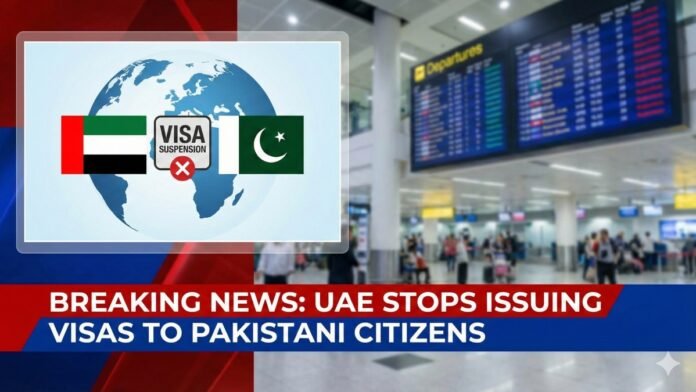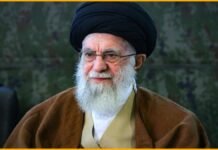
Key Points
- UAE has stopped issuing visas to most Pakistani citizens as of November 2025, confirmed by Pakistan’s Interior Ministry
- Only blue (government) and diplomatic passport holders currently eligible for UAE visas
- Approximately 1.9 million Pakistani nationals currently reside in the UAE, primarily in Dubai and Abu Dhabi
- Pakistani workers responsible for approximately 50% of all crimes in UAE labor force, according to official statistics
- 64,000 Pakistani nationals received work visas in 2024, but only 13,000 received visas in early 2025
- By mid-2025, UAE abruptly halted visa processing for Pakistani citizens
- Senate Human Rights Committee Chair Samina Mumtaz Zehri confirmed the visa halt but stated no formal ban has been imposed yet
- Crime complaints against Pakistani workers include theft, begging, blackmail, and unauthorized video recording of women
- Pakistani population in UAE exceeds yearly quota of 1.6 million, with numbers reaching 1.8-1.9 million
- Pakistan’s Interior Minister Mohsin Naqvi raised concerns with UAE counterpart in July 2025
- Pakistani passport ranks fourth-worst in global ranking for third consecutive year
- Pakistan’s finance ministry reported that nearly 500 visas are being processed daily at newly launched UAE Visa Centre in Pakistan
- UAE clarified that Pakistan is not subject to formal visa ban imposed on nine other countries in 2025
Pakistan’s Additional Secretary for the Interior, Salman Chaudhry, officially confirmed on November 27, 2025, that the UAE has effectively halted visa issuance to Pakistani citizens. During a hearing before the Senate Functional Committee on Human Rights, Chaudhry stated that the UAE is currently processing visas only for holders of blue (government) and diplomatic passports, while refusing applications from regular Pakistani citizens.
Scope of Visa Suspension
The UAE’s visa halt encompasses all categories of visas including tourist visas, visit visas, and work permits for standard Pakistani passport holders. However, Chaudhry noted that existing valid visas remain honored until their expiration dates, meaning that previously-issued visas have not been retroactively cancelled. This distinction suggests that the UAE intends to gradually reduce the Pakistani population through attrition rather than through immediate forced departures.
Timing and Escalation
While visa rejection issues emerged in July 2025 when Pakistan’s Interior Minister Mohsin Naqvi raised the matter with his UAE counterpart, the situation has progressively worsened. Officials acknowledged that while no formal blanket ban has been officially announced, the practical effect of visa issuance halts constitutes a de facto visa ban that is nearly impossible to overturn through diplomatic negotiations.
The Crime Crisis Driving UAE’s Tough Stance
Pakistani criminal activity in the UAE has reached alarming levels, according to official statistics and government statements, providing the primary justification for the visa restrictions.
Pakistanis Responsible for 50% of Labor Force Crimes
UAE authorities have informed the Pakistani government that Pakistani nationals are responsible for approximately 50% of all crimes committed within the UAE’s labor force. This extraordinarily high crime attribution rate, given that Pakistanis comprise only a fraction of the UAE’s total workforce, indicates a significant overrepresentation in criminal activity statistics.
Categories of Criminal Activity
The types of crimes attributed to Pakistani nationals in the UAE span a concerning range of serious offenses, including theft, organized begging networks, extortion and blackmail targeting women, and unauthorized video recording of women without consent. These allegations suggest organized criminal groups operating within the Pakistani expatriate community, rather than isolated criminal incidents committed by individuals.
Senate Human Rights Committee Confirmation
Senate Human Rights Committee Chair Samina Mumtaz Zehri publicly confirmed during the November 27, 2025 hearing that the UAE has halted visa issuance to Pakistani citizens. Zehri stated that the committee was briefed that the UAE issued no visas to Pakistanis, with only a handful granted recently “after much difficulty.”
Official Acknowledgment of Crime Problem
Zehri acknowledged that the crime problems cited by the UAE reflect genuine issues within the Pakistani expatriate community. She stated: “The continued increase in crime has forced UAE authorities to take strict measures.” This candid acknowledgment from a Pakistani government official suggests that the Pakistani government recognizes the legitimacy of UAE concerns, even while the visa restrictions create significant hardship for Pakistani workers.
The “No Formal Ban” Distinction
Zehri emphasized that while there is no formal, officially announced visa ban, lifting such restrictions would be “extremely difficult” because of the seriousness of the underlying crime problems. This language suggests that Pakistani officials recognize that further informal pressure will be required to facilitate any reversal of the visa halt, and that no quick diplomatic solution appears feasible.
Mid-2025 Abrupt Halt
By mid-2025, the UAE abruptly halted all visa processing for Pakistani citizens, effectively bringing new visa issuance to zero. The decision to halt processing entirely, rather than implementing gradual restrictions, suggests that UAE authorities faced significant domestic political pressure to take decisive action against Pakistani immigration.
The 1.9 Million Pakistani Expatriate Population
Approximately 1.9 million Pakistani nationals currently reside in the UAE, with the vast majority concentrated in major population centers including Dubai and Abu Dhabi. This population represents one of the largest Pakistani diaspora concentrations in any single country and constitutes a critical economic relationship for both nations.
Demographic Concentration
Pakistani expatriates are heavily concentrated in Dubai and Abu Dhabi, where they comprise substantial portions of the service, construction, and commercial sectors. These major cities have historically welcomed large-scale Pakistani immigration to fill labor market gaps in low-skilled and semi-skilled occupational categories.
Exceeding Official Quotas
The UAE maintains an official yearly quota of approximately 1.6 million Pakistanis, but the actual population has exceeded this quota significantly, reaching 1.8-1.9 million residents. This overage suggests either lax quota enforcement in recent years or significant numbers of Pakistanis entering through visa exemption programs or other pathways outside the formal quota system.
Annual Migration Flows
According to Pakistani government officials, between 600,000 and 800,000 Pakistanis leave the country annually to work overseas, with approximately 96% of this population directed toward Middle Eastern destinations. Of this annual outflow, only 200,000 to 300,000 Pakistanis return home annually, suggesting that most overseas Pakistani workers remain abroad for extended periods spanning multiple years.
Economic Impact on Pakistan
The UAE visa restrictions create severe economic consequences for Pakistan, a nation heavily dependent on remittances from overseas workers to stabilize its balance of payments and support domestic consumption.[1]
Remittance Dependency
Pakistan’s economy has become increasingly dependent on remittances from overseas workers, particularly from Middle Eastern destinations including the UAE. Pakistani workers in the UAE send substantial funds home annually, providing critical foreign currency inflows that support Pakistan’s external accounts and reduce its current account deficit pressures.
Employment Opportunities Threatened
The visa halt threatens employment opportunities for hundreds of thousands of Pakistanis who would otherwise migrate to the UAE for work. Young workers completing education or training programs in Pakistan now face dramatically restricted pathways to secure employment in the UAE, the historically preferred destination for Pakistani labor migration. This disruption forces Pakistani workers to seek alternative destinations including Saudi Arabia, Qatar, Oman, and Bahrain, potentially resulting in less favorable employment terms and lower wage prospects.
Remittance Reduction Risks
As Pakistani workers remain in Pakistan or migrate to lower-wage destinations, overall remittance flows to Pakistan will likely decline. This reduction in foreign currency inflows complicates Pakistan’s macroeconomic stabilization efforts and creates additional pressure on the Pakistani rupee exchange rate.
Enhanced Screening Rather Than Ban
Official UAE statements emphasized that tighter visa screening and longer processing times reflect enhanced background checks rather than nationality-based curbs. This language appears designed to preserve diplomatic flexibility and suggest that visa restrictions might be relaxed if Pakistan successfully addresses crime-related concerns.
Confusion from Social Media
UAE authorities acknowledged that confusion regarding Pakistani visa restrictions has spread through social media, triggering unnecessary recruitment delays and travel changes within the expatriate community. This acknowledgment suggests that while the UAE’s de facto visa halt is genuine, the specific details of implementation remain somewhat ambiguous and subject to local interpretation.
Pakistan’s Passport Global Ranking Crisis
The UAE visa restrictions compound an existing global reputation crisis for the Pakistani passport, which ranks as the fourth-worst passport globally for the third consecutive year.
Broader Regional Implications
The UAE visa restrictions signal potential problems for Pakistani workers across the Gulf region beyond the UAE specifically.
Saudi Arabia Concerns
Pakistani officials have warned that Saudi Arabia may implement similar restrictions if crime problems among Pakistani workers are not addressed. Given that Saudi Arabia is the second-largest destination for Pakistani overseas workers after the UAE, additional restrictions in Saudi Arabia would create an employment crisis of unprecedented magnitude for Pakistan.
Regional Labor Market Restructuring
The UAE and Saudi Arabia restrictions suggest a fundamental shift in Gulf state approaches to Pakistani labor importation, potentially driven by changing demographic compositions, automation, and concerns about social cohesion among large immigrant populations.
Long-Term Outlook and Potential Solutions
Resolution of the UAE-Pakistan visa crisis will likely require sustained Pakistani government efforts to address crime problems within Pakistani expatriate communities.
Crime Reduction Requirements
Pakistani authorities must implement effective law enforcement and community engagement strategies to reduce criminal activity among expatriate workers. This may include cooperation with Pakistani diaspora organizations, religious institutions, and community leaders to promote lawful behavior and discourage criminal activities.
Diplomatic Negotiations
Pakistani government officials will need to conduct sustained diplomatic negotiations with UAE counterparts to demonstrate progress on crime reduction and secure commitments to gradually resume visa processing for regular Pakistani passport holders. Such negotiations will likely span many months or years and require concrete evidence of improved behavior.
Uncertainty and Economic Hardship
In the near term, hundreds of thousands of Pakistani workers face economic hardship through reduced employment opportunities and constrained migration options. The uncertainty surrounding visa policy will complicate workforce planning for both individual workers and employers seeking to hire Pakistani labor.




















































